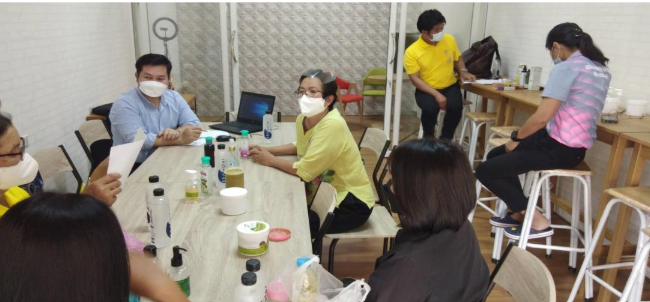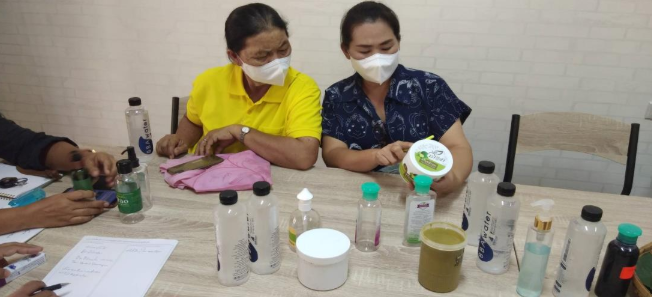การวิเคราะห์คุณลักษณะที่เหมาะสมและแนวทางการพัฒนาผลิตภัณฑ์บรรจุภัณฑ์ของแชมพูออร์แกนิคในจังหวัดอุบลราชธานี
บทคัดย่อ/Abstract
งานวิจัยมีวัตถุประสงค์เพื่อ (1) ศึกษาพฤติกรรมของผู้บริโภคในการเลือกซื้อแชมพูออร์แกนิค (2) วิเคราะห์คุณลักษณะที่เหมาะสมของผลิตภัณฑ์แชมพูออร์แกนิคที่ผู้บริโภคพึงพอใจ (3) เพื่อศึกษา การพัฒนารูปแบบของบรรจุภัณฑ์ของแชมพูออร์แกนิคให้เป็นที่ยอมรับของผู้บริโภค (4) เพื่อส่งเสริม ให้ผู้ประกอบการขนาดย่อม (SMEs) เกิดการเรียนรู้ตลอดชีวิต และพัฒนาทักษะเพื่ออนาคต ส่งเสริม ให้มีทักษะความคิดสร้างสรรค์ในการออกแบบบรรจุภัณฑ์ กลุ่มตัวอย่างการวิจัยเชิงปริมาณ คือ ประชากรทั่วไปในเขตอำเภอเมือง จังหวัดอุบลราชธานี จำนวน 400 คน และกลุ่มตัวอย่างการวิจัยเชิง คุณภาพ คือ ผู้ผลิตแชมพูออร์แกนิค จำนวน 5 ราย เครื่องมือที่ใช้ในการเก็บข้อมูล คือ แบบสัมภาษณ์ เชิงลึก แบบสอบถาม โดยใช้ข้อมูลพฤติกรรมผู้บริโภคในการเลือกซื้อแชมพูออร์แกนิค มาจำแนกกลุ่ม ผู้บริโภคด้วยวิธีการวิเคราะห์กลุ่มข้อมูล (Cluster Analysis) ต่อจากนั้นจึงหาคุณลักษณะที่เหมาะสมของผลิตภัณฑ์แชมพูออร์แกนิคที่ผู้บริโภคพึงพอใจโดยใช้แนวคิดแบบจำลองคาโน (Kano Model) พบว่า(1) กลุ่มผู้บริโภคแบ่งออกเป็น 2 กลุ่ม คือ กลุ่มใส่ใจดูแลสุขภาพเส้นผม สาเหตุที่เลือกซื้อเนื่องจากมี ส่วนผสมของสมุนไพรแท้ 100 % มีคนแนะนำให้ใช้ และกลุ่มเชื่อโฆษณา รีวิวสินค้า สาเหตุที่ซื้อเนื่องจาก มั่นใจในคุณภาพของสินค้าตามคำแนะนำ (2) คุณลักษณะที่เหมาะสมของผลิตภัณฑ์แชมพูออร์แกนิคที่ ผู้บริโภคพึงพอใจ คือ ฉลากระบุส่วนประกอบ ข้อความบ่งบอกถึงคุณประโยชน์ต่อเส้นผม ความเข้มข้นของสมุนไพรแท้ 100 % ผลิตภัณฑ์มีความสวยงาม กลิ่นหอม สีธรรมชาติของสมุนไพร มีข้อมูลที่อยู่ของแหล่งผลิต ข้อมูลวันเดือนปีที่ผลิต และวันเดือนปีที่หมดอายุ (3) องค์ประกอบของ ผลิตภัณฑ์ด้านคุณภาพ ด้านกายภาพของสินค้าทั้ง 2 ด้าน พบว่า มีค่าเฉลี่ยอยู่ในระดับมากที่สุด และ (4) ส่งเสริมให้เกิดการเรียนรู้ตลอดชีวิต ต้องเริ่มจากการกำหนดเป้าหมายการเรียนรู้ การวางแผน การเรียนรู้ ดำเนินการเรียนรู้จริง แสดงผลการเรียนรู้ และสะท้อนคิดจากการเรียนรู้ในธุรกิจ
The objectives of this research were: (1) to study the behavior of consumers in selecting organic shampoo, ( 2) to analyze the characteristics of organic shampoo products that are suitable for the consumers’ satisfaction, ( 3 ) to study the development of the packaging of organic shampoo to be accepted by consumers, and (4) to support small entrepreneurs (SMEs) to have lifelong learning and develop skills for the future, and encourage them to have creative skills in packaging design. The samples of the quantitative research were 400 people in Mueang District, Ubon Ratchathani and the samples of the qualitative research were five organic shampoo manufacturers. The tools used to collect data were an in-depth interview and a questionnaire. Data of consumer behaviors in selecting organic shampoo were classified using Cluster Analysis. Then, the suitable characteristics of organic shampoo products that meet the consumers’ satisfaction were determined using Kano Model. It was found that (1) the consumers were divided into two groups. One group was those who cared about hair health and they purchased the products because it contained 100% pure herbal ingredients and someone recommended it. Another group was those who believed in advertising and product reviews, and they purchased the products because they trusted the quality of the product from the recommendations. (2) The suitable characteristics of organic shampoo products that satisfied consumers were: label with ingredient detail, the text indicating the benefits to the hair, the concentration of 100% pure herbs, beautiful product package, scent, natural color of herbs, the address of the manufacturer, anufacturing date and expiring date. (3) For the components of product quality in two physical aspects of the products, it was found that the mean was at the highest level. (4) The promotion of lifelong learning must start from setting learning goals, planning the learning, conducting real learning, presenting learning results, and reflecting thoughts from the business learning.


